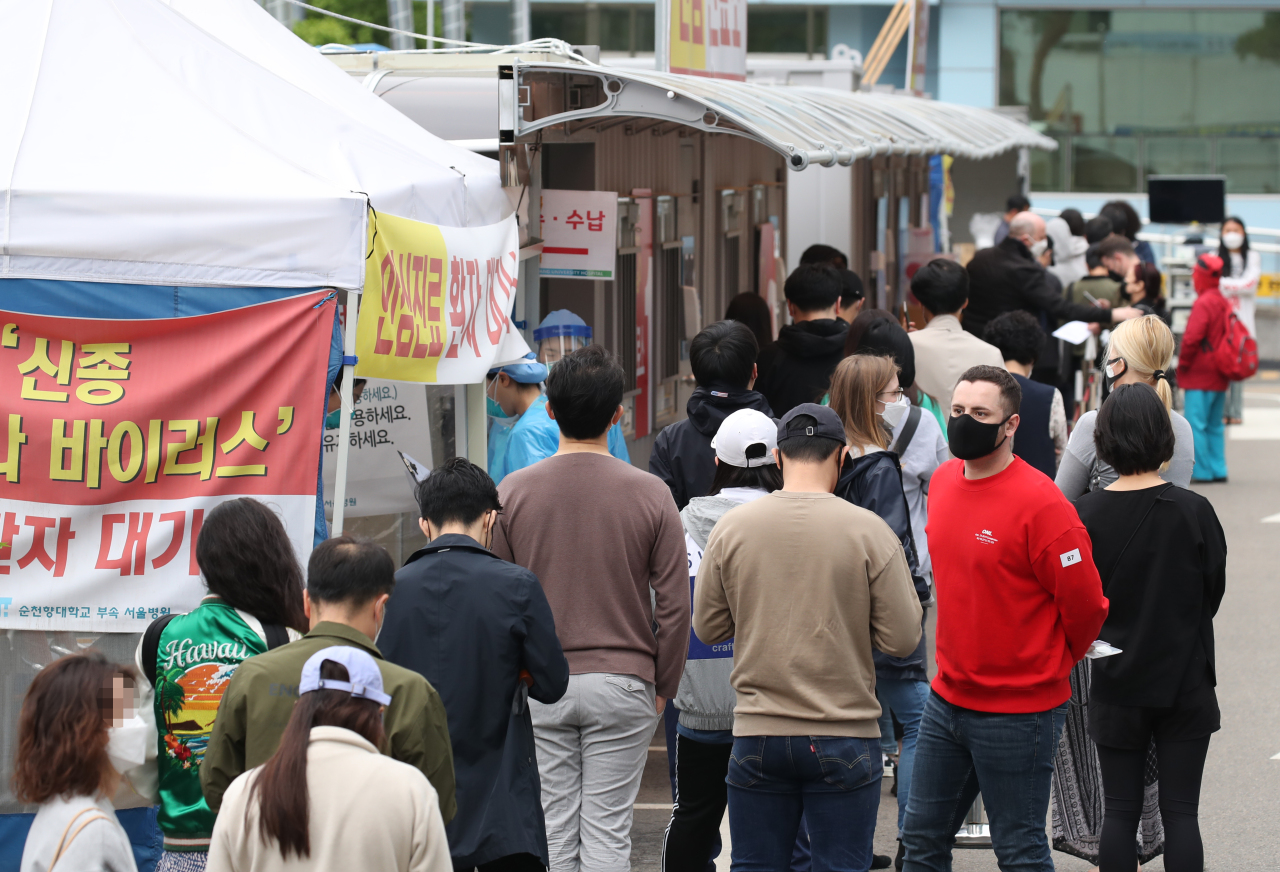
Coronavirus may have been spreading undetected in late April and early May, prior to the Itaewon nightclub transmissions, health authorities investigating infection routes of over 100 patients linked to the club cluster said Tuesday.
Kwon Jun-wook, deputy director of the Korea Centers for Disease Control and Prevention, said the mass infection that occurred in Itaewon has multiple epicenters.
He said there were cases with no apparent correlation with the cluster’s first identified patient and the chain of transmission from him.
“We assess that silent transmissions already have been underway in unspecified places in the community and it met the dense environment (of clubs and bars) from April 24 to sharply increase,” Kwon said during a daily virus briefing.
South Korea had initially focused its contract tracing efforts on visitors of five clubs and bars -- King Club, Trunk Club, Club Queen, Soho and H.I.M. between April 24 and May 6, where a 29-year-old man tested positive was the first case in the new COVID-19 hotbed.
On Sunday, a 20-year-old man, who visited another club Made in Itaewon, where generally thousands of clubbers gather on weekends, on May 2, tested positive. His movement during the outing didn’t overlap with that of the first patient.
As of Tuesday noon, the total number of new infections traced to clubs and bars in Itaewon had increased to 102, according to the Korea Centers for Disease Control and Prevention.
Because of their proximity to the clubs and the age groups that enjoy nightlife, cases were concentrated on those in their 20s and 30s living in Seoul and Gyeonggi Province.
Detection of two new cases that are not related to the five nightlife entertainment sites prompted a second thought that source of infection caused the fresh outbreak could have gone beyond the first case.
“The best scenario is early detection of limited transmission but the worst scenario will be belated discovery when transmission already has taken place in the community,” Kwon said.
Health authorities are continuing their efforts to curb coronavirus transmission by separating infected people from the public while juggling rights issues stemming from testing and contact-tracing methods.
Speaking at a press briefing, Seoul Mayor Park won-soon reiterated his call for cooperation of people who may have been exposed to the virus during their visits to Itaewon between April 24 and May 6. The city reported at least 64 cases relating to the new infection cluster.
“We believe there’s a high-risk factor due to uncertainty over identifying the source of infection and the fact that there are still many unspecified cases due to the nature of the situation,” he said.
Authorities faced an uphill battle in bringing people to health centers for testing, the first step for containment measures for potential patients, as some of them hesitated to reveal their identities, fearing the possibility of the unwanted outing of their sexual orientation as their history of visits to gay clubs could be exposed to the public.
With cooperation of telecom carriers and the National Police Agency, the city obtained a list of 10,905 people who used their cellphones connected to cell towers nearby Itaewon clubs and bars between April 24 and May 6. It sent out a notice to advise them of ways to visit community health centers for testing and imposed a 14-day self-isolation period via text messages.
The instruction was also delivered to 494 people who were found to have made credit card transactions at the five entertainment facilities in a separate list provided by credit card firms.
Anonymous testing, introduced by the city Monday to enable examinees to undergo a diagnostic test by filling in their phone number only to protect their privacy, has shown positive results to attract more participation.
The number of tests conducted on Monday almost doubled to 6,544 from 3,500 a day earlier.
In Seoul, some 7,272 people linked to the Itaewon mass infection cases, including clubbers and those who have come in close contact with them, have got tested.
In response to concerns over rise in homophobia prompted by speculation linking the recent outbreak to gay people, Health Minister Park Neung-hoo reminded citizens that everyone can be infected with the virus regardless of their social background, region and religion.
“Discrimination and exclusion creates a social atmosphere that drive people to conceal the fact that they are infected, resulting in obstruction in containment efforts,” Park said.
The Seoul City government set out measures to strengthen protection of rights of people who are hesitating to come forward due to concerns over personal data leakage during the process of testing and epidemiologic survey.
Joining hands with civic rights groups, Seoul plans to launch a hot line that will receive complaints from citizens in the event of privacy violation and will provide a citizen-driven investigation and consultation by groups.
Health authorities and experts are taking note of high infection rates among young people, who often present only mild symptoms or no symptoms, in this case that could lead to mass transmission to more vulnerable and elderly groups.
On Monday, an 84 year-old woman tested positive after she was in close contact with her a 29-year old grandson who was confirmed infected with the virus following clubbing in Itaewon.
Buoyed by significant signs of slowdown in new virus cases and urgency to revive sluggish economy, the country relaxed its social distance drive from May 6. But the emergence of a fresh cluster of infections prompted concerns over second wave of coronavirus here.
World Health Organization chief Tedros Adhanom Ghebreyesus said Monday the resurgence of cases in South Korea, China and Germany following the lifting of stay-at-home restrictions demonstrates the complexity of easing these measures.
“Fortunately, all three countries have systems in place to detect and respond to a resurgence in cases," he said.
By Park Han-na (hnpark@heraldcorp.com)









![[Hello India] Hyundai Motor vows to boost 'clean mobility' in India](http://res.heraldm.com/phpwas/restmb_idxmake.php?idx=644&simg=/content/image/2024/04/25/20240425050672_0.jpg&u=)









